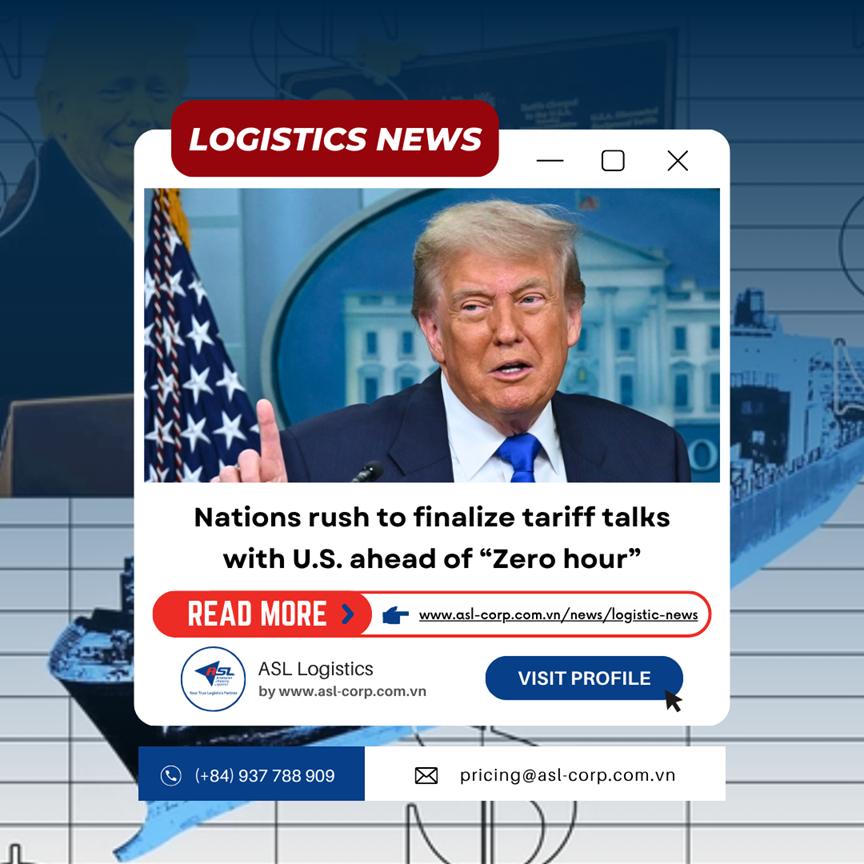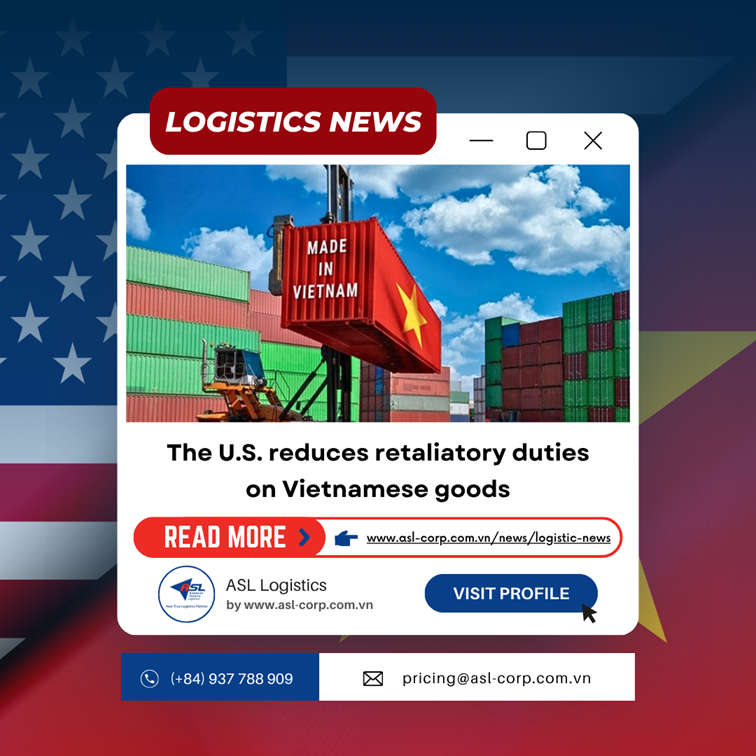Logistic News
U.S. TAX SHIFT OPENS WINDOW FOR VIETNAM'S ECONOMIC SELF-RELIANCE
18 April 2025
VCCI Chairman stated: “If countervailing duties are imposed, Vietnamese businesses will be hit hard — losing market share and competitiveness. However, there is always opportunity in adversity. This is the time for us to reassess our development strategies, strengthen internal capabilities, adapt proactively, and redefine Vietnam’s position in the global supply chain.”
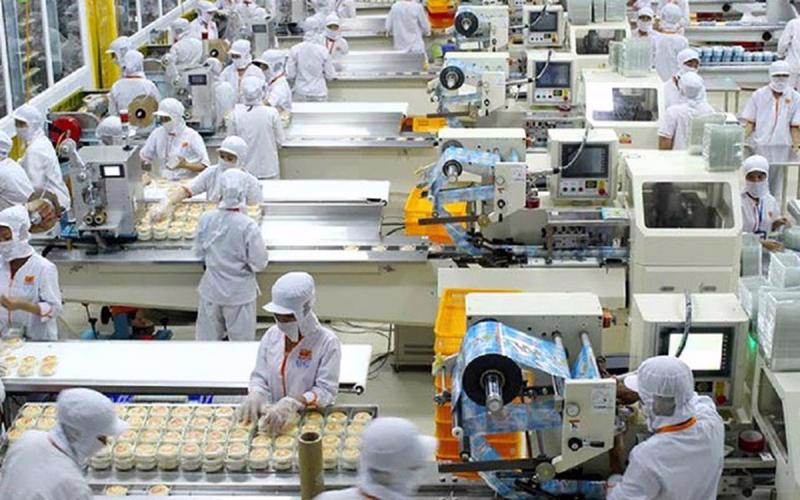
Vietnamese Businesses Must Respond Flexibly to the New U.S. Tariff Policy
At the seminar titled “U.S. Countervailing Duties and the Response of Vietnamese Enterprises” held by the Vietnam Chamber of Commerce and Industry (VCCI) on April 18, VCCI Chairman Pham Tan Cong shared that on April 2, U.S. President Donald J. Trump signed an executive order imposing new countervailing duties on all imported goods from countries and territories around the world. Among them, Vietnam faces one of the highest tariff rates — up to 46%.
Opportunity in Adversity
Although the U.S. has announced a 90-day suspension of these tariffs to allow for negotiations, the threat remains serious and complex — posing significant risks and challenges for Vietnamese exporters, especially those shipping to the U.S., which remains Vietnam’s largest export market.
According to VCCI’s review, more than 29% of Vietnam’s total export turnover in 2024 was to the U.S., with key export categories including electronics, textiles and garments, footwear, wood and wood products, seafood, and machinery. In some sectors, such as furniture, textiles, and electronics, exports to the U.S. accounted for over 40%, and in some cases even exceeded 50%.
“This shows that if the countervailing duties take effect, Vietnamese businesses will suffer serious consequences — losing market share, facing declining competitiveness, disrupted production, job losses, and broader impacts on GDP growth and macroeconomic stability,” said Chairman Pham Tan Cong.
Beyond that, Vietnam also faces spillover effects and trade diversion. Goods from countries subject to these new tariffs may be rerouted to alternative markets like Vietnam, increasing competition, heightening risks of trade fraud, transshipment activities, and potential anti-circumvention investigations.
Despite these concerns, the VCCI Chairman remains optimistic, stating that there is opportunity in adversity. He emphasized that now is the right time for Vietnam to rethink its development strategies, build stronger internal capacity, adapt proactively, and redefine its role within global supply chains.
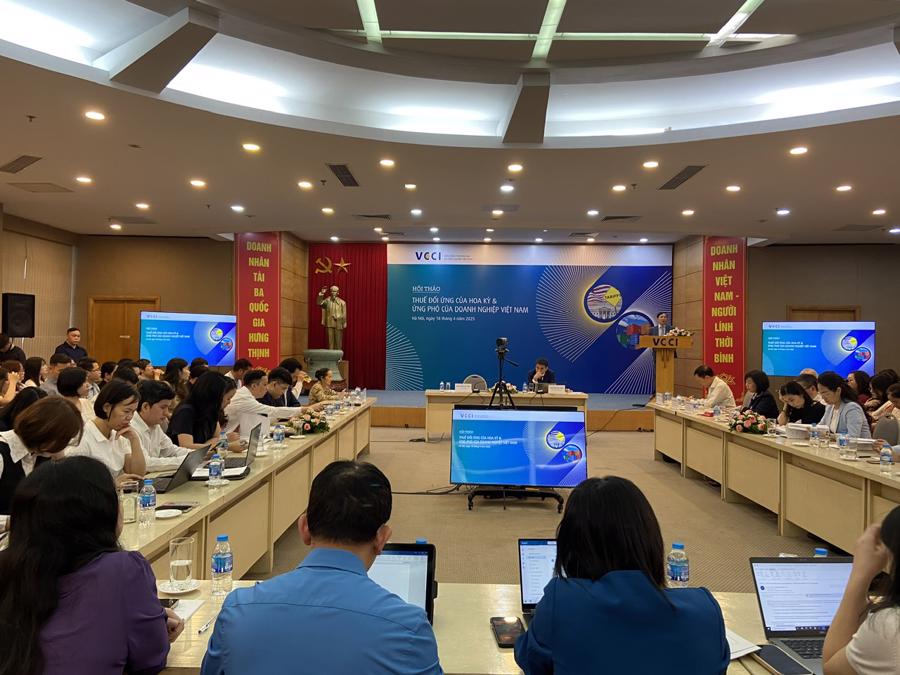
Agreeing with the view, Dr. Cấn Văn Lực, a member of the National Financial and Monetary Policy Advisory Council, emphasized that despite the challenges, there are three major opportunities still open for Vietnamese businesses. These include: expanding exports to the U.S. — even if limited, they should be seized; capitalizing on the global shift in investment and supply chains; and diversifying markets while strengthening internal capacity to meet new standards, thereby enhancing resilience and self-reliance.
Adapting Flexibly – Turning Risk into Opportunity
In light of this, VCCI Chairman Phạm Tấn Công proposed five key recommendations for Vietnam to respond and overcome the challenges:
First, initiate high-level strategic dialogue with the United States to work toward bilateral agreements, ease tensions, improve transparency, and promote imports from the U.S. (such as LNG, agricultural products, and high-tech goods), aiming to rebalance trade and build political trust.
Second, diversify export markets and supply chains by leveraging next-generation free trade agreements (FTAs) like EVFTA, CPTPP, and RCEP to expand into the EU, Canada, and Australia. At the same time, tap into potential markets such as Southwest China, the Middle East, and Latin America, while also focusing on developing the domestic market.
Third, restructure supply chains and develop supporting industries. This includes increasing localization rates, tightening control over product origin, and investing in foundational industries such as chemicals, new materials, logistics, and high technology to reduce import dependence and mitigate trade risks.
“Developing the domestic market — with its population of 100 million — offers a strong foundation for Vietnamese businesses. Restructuring supply chains and building up supporting industries will help us climb higher in the global value chain,” Mr. Công noted.
Fourth, take part in strategic U.S. supply chains. Vietnam should invest in sectors like semiconductor technology, green industries, and renewable energy to become a reliable alternative to China in global value chains. According to him, this is a “golden opportunity” Vietnam must proactively seize.
Fifth, enhance institutional capacity and infrastructure. This means improving the investment climate, ensuring transparency in policy-making, upgrading workforce quality, and strengthening logistics infrastructure — all essential for sustainable and competitive growth.
“This isn’t the first major challenge Vietnam has faced. When we started economic reforms in 1986, the entire Eastern European market collapsed by the early 1990s, leaving our economy without its main support. Now, as we enter a new era, we are again confronted with a shock from the Western hemisphere. But the Vietnamese people have always been good at adapting. Businesses now need to stay flexible and turn risk into opportunity if we want to reach our 2045 goal of becoming a high-income nation,” Mr. Công emphasized.
He also mentioned the Party’s four-pronged strategic foundation to drive Vietnam’s economic “take-off”: restructuring — reorganizing the nation and streamlining administration; a resolution on science and technology; a new mindset and better conditions for private sector growth; and recognizing global economic integration as a long-term, ongoing mission.
On the response side, Dr. Lực stressed that the top priority is to successfully negotiate with the U.S. and promptly address the 24 barriers across 14 sectors that the U.S. has raised with Vietnam. The Vietnamese Government is already taking strong action to resolve these issues, which will benefit not only American businesses but also support the long-term development of Vietnamese enterprises.
He further emphasized the need to support sectors most affected by the tariffs. In particular, he called for greater attention to the domestic market and private businesses, noting that a strategic proposal for private sector development should soon be submitted to the Politburo. This, he said, is a golden opportunity for Vietnam to boost its resilience, self-reliance, and autonomy.
For enterprises, Dr. Lực advised improving transparency regarding the origin of goods, clarifying the degree of transshipment, and openly disclosing the localization ratio in products. He also stressed the importance of fully leveraging Vietnam’s 17 FTAs — of which only about 31% are currently being utilized — leaving ample room for growth.
“This year and the new term ahead are critically important as we embark on a fresh reform journey. We need a new mindset — no more hesitation, only action — to contribute meaningfully to the country’s progress in this new era. We must not be complacent or pessimistic. Vietnam still has plenty of untapped potential, and we’ve always managed to steer through tough times,” Dr. Lực affirmed.
Source: VnEconomy

Head Office
ASL Hồ Chí Minh
Số 31/34A Ung Văn Khiêm, Phường Thạnh Mỹ Tây, TP. Hồ Chí Minh, Việt Nam
 Công Ty Cổ Phần Giao Nhận Vận Tải Mỹ Á
Công Ty Cổ Phần Giao Nhận Vận Tải Mỹ Á
 (+84)28 3512 9759
(+84)28 3512 9759
 (+84)28 3512 9758
(+84)28 3512 9758
 pricing@asl-corp.com.vn
pricing@asl-corp.com.vn
 mdirector@asl-corp.com.vn
mdirector@asl-corp.com.vn
 www.asl-corp.com.vn
www.asl-corp.com.vn
LOGISTICS SERVICES










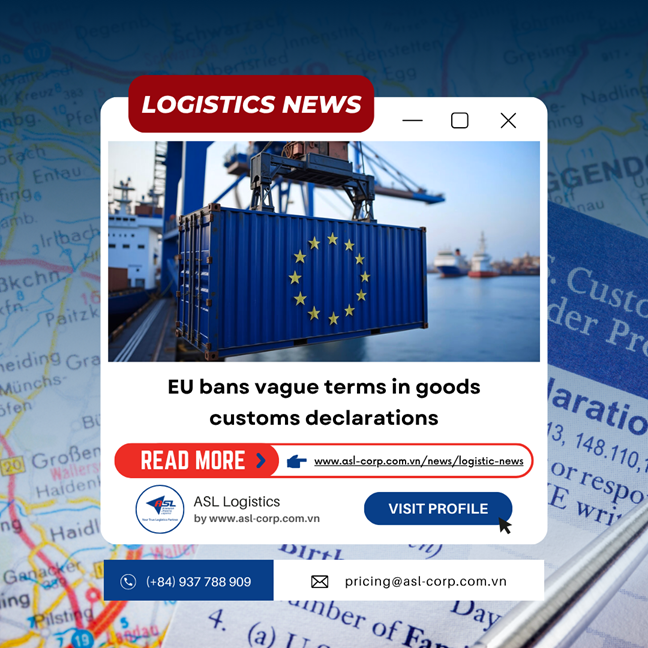
.png)
.png)

.png)


